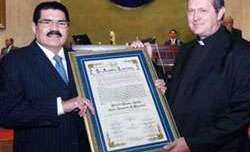Of the “peace” that followed the First World War, Pope Pius XI wrote in 1922: “This peace was only written into treaties; it was not , however, written into the hearts of men and women, who still desire to fight one another and to continue to menace in a most serious manner the quiet and stability of civil society.”
The legacy of World War I, as Pius predicted, was a century in which nations devoted themselves to doing battle and making instruments of war.
Today, in the wake of the century’s most recent war, the 43-day war in the Persian Gulf, Church leaders are calling as Pius did for a conversion of hearts—for penance to cast out the spirit of hatred and war, and replace it with a spirit of truth and love.
“No war can start on the battlefield unless it is first raging in the human heart,” said Cardinal Joseph Cordiero of Karachi, Pakistan, recently. “No peace can enter the chambers of debate unless it first begins in the human heart.”
In the aftermath of the Gulf War, Catholic reflection has focused on the material and spiritual costs of the war and what Pope John Paul II has called “the root causes” of the war—in the sinful aspirations of human hearts.
Catholic analysts say that only by studying the causes and consequences of the war can there be the penance, reconciliation, and conversion needed to halt this century’s continuing spiral of warfare.
Catholic leaders say that the Gulf War was another reminder of the destructive nature of modern warfare. But they also recognize that the Gulf War was “a new kind of war,” to quote Archbishop Joseph Ryan, head of the nation’s Military Archdiocese.
For him and others, the war was a harbinger of the nature of war in the post-Cold War era. In the Gulf, America and the Soviet Union were aligned against a Third World nation, fighting to retain control over a vital industrial resource.
A “regional” war, the conflict highlighted the inextricable links between nations and the impossibility of isolating such conflicts to a single battleground.
The Gulf War, Archbishop Ryan noted, was “a particularly strange one with its radical and religious overtones.” While stirring long-standing tensions between the world’s rich and poor peoples, the war pitted the predominantly white Christian nations of Europe and North America against a dark-skinned, non-European, non-Christian enemy.
The war also highlighted the power and influence of the communications media. The war, Pope John Paul noted, was “waged not only with weapons of war, but also to some degree through the media.” The conflict showed that when “respect for truth is lacking,” military and government officials on both sides could easily employ the mass media as a “force for injustice,” he said.
Some analysts were disturbed by the U.S. media’s refusal to consider the religious and moral aspects of the conflict, and its refusal to cover domestic and foreign opposition to the war. More troubling was the media’s presentation of the war as a bloodless, machine-like process, executed according to principles of calculated efficiency and precision.
Archbishop Cahal Daly of Armagh, Northern Ireland, decried the “anesthetized language’
invented by military officials and adopted without question by the media. The euphemisms employed to describe weapons of destruction and the killing of civilians caused people to “forget about the gore and the grime and the mangled bodies on the ground,” he said.
The media performed “the ultimate disservice to the human family” by trying to “santize war,” said Archbishop Thomas Winning of Glasgow, Scotland. The “truth about war” is that it is “ugly, brutal, and degrading,” he said, and that truth should have been told.
Burying Children
The full extent of that truth may never be known, given the media’s timidity and the censorship imposed by U.S. military officials and the Iraqi government.
Catholic analysts say it is nonethless important important to consider the extent of civilian deaths and innocent suffering. U.S. sources estimate that between 50,000 and 65,000 Iraqis were killed and just as many wounded in the 43-day conflict, making it one of history’s bloodiest confrontations.
The impact of the war on the civilian population of Iraq confirmed what Minneapolis Archbishop John Roach had warned a U.S. Senate committee before the war: It is the innocent who suffer most.
Among the last dispatches from Baghdad before Iraq imposed a media blackout was a report on the ministry of Archbishop Marion Oles, the Vatican’s top diplomat to Iraq.
Archbishop Oles told of working two days to help a woman find a place to bury her child, who had been killed by an allied air attack. He spoke, too, of the psychological torment caused by the endless waves of allied air attacks, and of hospitals filled with children with broken and amputated limbs, and the shortage of medical and other supplies needed to deal with what he described as massive civilian casualties.
As a result of the allied attacks, much of Iraq is without clean, running water, and Iraqis are faced with an epidemic of cholera; babies and children are dying of dysentery and starvation. There is no electricity to refrigerate food or to power hospital sterilization or other equipment. With roads, bridges, and civilian transportation systems destroyed, most Iraqis, especially the poor, have no way out.
A recent editorial approved by the Vatican’s Secretary of State pointed to those cruel spoils of war as evidence that the U.S. and its allies went well beyond their United Nations mandate of liberating Kuwait and seriously violated moral principles of “civilian immunity.”
Seattle Archbishop Raymond Hunthausen said he will remember the war for one haunting image, glimpsed on TV: “a young girl, her hand still clutching a stuffed animal, lying dead at the entrance of a bomb shelter” in Baghdad.
Nor was the region’s environment immune from the ravages of war. The fallout from the Iraqi reactors destroyed by the allies is expected to be worse than the meltdown of the Soviet nuclear plant at Chernobyl in April 1986, which affected plant, animal, and human life in both the Soviet Union and neighboring nations.
The war demonstrated how fragile and connected the earth’s environment is, Archbishop Winning said, noting that Iraq’s demolition of Kuwait oil fields “could affect the monsoon season in parts of Asia, bringing crop failure and starvation.”
Penance Now
In response to what they describe as spiritual and material divisions caused by the war, Catholic leaders are calling for penance and reconciliation, an uprooting of the sins that brought the world to war.
“Peace,” John Paul has said, “awaits our personal contribution…a contribution expressed through concrete reconciliation.”
The Pope has challenged Christians to acknowledge their personal and collective sinfulness and to take concrete steps to convert themselves and their nations to the ways of peace.
Conversion from militarism and identifying with the poor, the Pope has suggested, would mean basing defense and foreign policy decisions, not on power, influence, and money, but on the promotion of human equality and dignity and on the right of all peoples to “contribute to the common good of humanity.”
Conversion would recognize that money spent on arms is money diverted from human needs. As Archbishop Renato Martino, the Vatican’s U.N. observer, has said, weapons are “paid for … always, by people who are most poor.”
Conversion would recognize that nations that make instruments of war will eventually feel compelled to use them. “The excess of armaments makes a country drunk with ambition and, sooner or later, it rushes toward war,” warned Cardinal Roger Etchergaray, head of Pontifical Council for Justice and Peace.
By changing the principles that guide U.S. foreign policy and by curbing arms sales, the U.S. could ensure that it never again contributes to the creation of a ruthless dictator like Saddam Hussein.
Penance for the sins that brought the nation to war will require Americans to “make fundamental changes in our way of living and our way of consuming,” according to Bishop Michael Kenny of Juneau, Alaska.
This is a theme in American bishops’ reaction to the war—that Americans are consuming most of the world’s resources while other peoples live in squalor and need; this means, they say, Americans need to live more simply, to develop renewable energy sources, and to make the personal sacrifices needed to promote a more just and equitable world international order.
In the wake of the religious divisions aroused by the war, Catholic leaders are also calling for increased efforts at interreligious understanding.
Bishop Leroy Matthiesen of Amarillo, Texas, blames many of the problems in the Middle East and elsewhere in the Third World on religious and racial bigotry, especially the “vilification” of Muslims and Jews.
He also questioned the alliance of convenience between religion and American military power. Christians, he said, should Christians to repent for “invoking the God of battle” in going to war with Iraq.
He and other say religious rhetoric invoked during the war indicated a new way of American “exceptionalism,” which equates the country’s military might with its moral righteousness.
Bishop William Bullock of Des Moines, Iowa said: “‘In God we trust ‘we read on the money we spend. ‘One nation under God’ we proclaim in our pledge of allegiance. Our actions do not always follow our proclamations and bold declarations about our beliefs and principles.”
He questioned whether Americans realize the implications of invoking God to justify the nation’s institutions and policies. “God is serious about his Word,” he warned, “and it will save us or condemn us.”
More than half a century later, Pope Pius XI’s warnings remain relevant: “He who sings the song of loyalty to his earthly country must not become a traitor in disloyalty to his God, his Church, and his heavenly country.”
Also important in light of the Gulf War is Pope John Paul II’s prayer of Jan. 27, on the eve of the war: “May the infinite love of the Creator help everyone to understand the absurdity of a war in His name.”
In the aftermath of this war, Catholic officials have concluded that, while there may still be just wars, there are no holy wars.
First published in The Evangelist (March 21, 1991)
© David Scott, 2009. All rights reserved.


